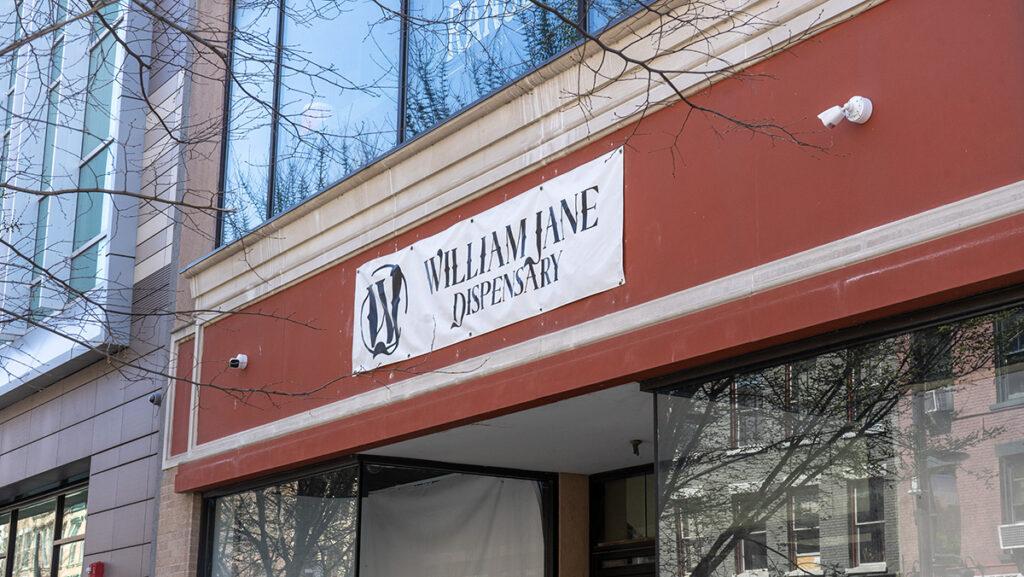Binghamton-based businessman William Durham opened William Jane Dispensary, the first legal dispensary for people over 21 in Ithaca on March 16.
Recreational marijuana use has been legal in New York state since March 2021, and in November 2022, the first 28 recreational marijuana licenses were awarded. The State Cannabis Control Board started approving Conditional Adult-Use Retail Dispensary licenses in November for non-profits and entrepreneurs who have been incarcerated for marijuana-related crimes or who help those who have.
The licenses come from the Seeding Opportunity Initiative, an initiative that allows people with previous cannabis-related criminal offenses to sell cannabis and formerly incarcerated New York farmers to grow it. The initiative provides an economic opportunity to business owners with previous cannabis convictions and gives local farmers priority over sales.
Durham, who has experience operating small businesses and has a previous marijuana conviction, said he applied for the CAURD license in 2022. In 2003, Durham was driving in a highly patrolled area when he was pulled over by the police. Durham said he was subjected to a car search where the police found cannabis.
Durham said he wanted to open the dispensary in Ithaca because he loves the area and a retail space on The Commons opened up.
“So when the location [in Ithaca] became available [it] was a no-brainer for me,” Durham said. “I thought any type of retail business and The Commons as far as cannabis goes would be good, I just thought the location was great for it.”
Ithaca College was ranked 17th by Business Insider in a list of the top 20 colleges where students smoke the most weed. In a study that surveyed over 12,000 college students’ cannabis use habits within the past three months, 65.7 percent of college students surveyed said they had used the drug and 11.6 percent said they use marijuana daily or almost daily, according to a the 2021 Statista survey.
Sophomore Zoe Blain said she feels the use of cannabis is common on campus and the dispensary is going to be beneficial to students who use cannabis because it is regulated.
“Ithaca is weed,” Blain said. “This campus has a stench to it and anywhere you go, you can find someone smoking weed.”
Thomas Knipe, deputy director of Economic Development in the City of Ithaca, said the city supports the CAURD program and New York state’s social equity approach to cannabis integration.
“The CAURD program gives entrepreneurs who’ve owned a business in New York state, [and] also folks who’ve been involved with prior cannabis-related offenses the leg up [in the marijuana industry],” Knipe said.
Knipe said both the City of Ithaca and the state will benefit from marijuana sales because of tax revenue. Knipe said the city will collect a 3% tax for regulated sales of marijuana while Tompkins County will collect 1% and New York state will collect 9%.
States that have already legalized cannabis have seen high tax revenue from the product. Washington state has legalized recreational cannabis since 2012, in 2022, the state collected 515.2 million dollars in tax revenue from legal marijuana. According to the New York Comptroller’s Office, New York is expected to receive $436 million in tax revenue per year for the state based on the state’s population of marijuana users and tax rates on marijuana.
“One of the biggest factors right now determining the level of benefits [to] the local community will be [if] the Office of Cannabis Management and its enforcement wing will successfully shut down and prevent illegal and unlicensed dispensaries from operating and competing with an unregulated market,” Knipe said. “We are strongly encouraging OCM to increase its enforcement against the unlicensed dispensaries.”
Durham said he agrees that these stores are an issue and make it harder for legal dispensaries to compete because of illegal dispensaries that do not comply with state regulations. In order to maintain a CAURD license, an applicant is required to comply with the OCM requirements, including only purchasing cannabis tested in a lab, using an inventory tracking system and having systems in place to prohibit the sale of cannabis to minors.
“It sucks that [the stores are] able to get away with this, especially when I gotta work so hard [to] stay in compliance and do these other things in order to keep my license going,” Durham said, “But at the end of the day, just like anything else, there’s trials and tribulations … [and], if it didn’t happen, it’d be great, but it, it’s happening. So it’s just a matter of fixing it.”
Blain said there is an obvious distinction between illegal and legal dispensaries and people will be more trusting of legal dispensaries.
“When you buy [from illegal dispensaries] they don’t check your ID, it is all in cash and under the counter,” Blain said. “The people [at dispensaries] really care about the product versus [illegal dispensaries] where they are just selling weed to make a buck.”
Durham said buying from a dispensary decreases the chance of receiving marijuana products that are laced with harder drugs because dispensaries regulate and test marijuana, unlike unregulated sellers. While laced marijuana is less common than other drugs like cocaine or opiates, there is still a chance that dealers may lace the product to increase psychoactive effects.
“A lot of parents are worried about kids grabbing things and smoking them off the streets,” Durham said. “I have seen situations, not personally, but people smoke things and they’re never right again, so I would imagine that [regulation] alone is a benefit.”
Thomas Dunn, associate director and deputy chief of the Office of Public Safety and Emergency Management, said that while marijuana is decriminalized in New York, the college is still a federally funded campus, so students are not permitted to carry or use marijuana on campus.
“In New York state it is still unlawful for a person under the age of 21 to possess marijuana so even [by] New York’s states standards it’s not permitted,” Dunn said. “We have a certain percentage of our students that do participate in the usage of marijuana [and] alcohol, it does occur.”
Dunn also said the dispensary is a safer option for students over 21 who can legally use marijuana and advises for safer usage of the drug in general. Students who are caught unlawfully consuming alcohol, marijuana or possessing related paraphernalia at the college are subjected to a written warning, a $50 fee and an alcohol or marijuana education assignment, according to the Ithaca College Alcohol and Other Drug Policy.
“I would certainly advocate for people to know what they’re buying,” Dunn said. “Avoid taking too much at one time. … If a person is in need of medical assistance after smoking or ingesting an edible, don’t hesitate to call because in New York state we have a good samaritan law and we also have medical amnesty at Ithaca College.”
The college’s medical amnesty program allows students to seek medical assistance for drug or alcohol-related emergencies with no student conduct consequences, both the student who needs assistance and the student that calls for assistance will not face consequences for seeking help.
“Nowadays you don’t know what is going into [cannabis products], especially oils and edibles, so I think the dispensary is a promising opportunity for people to be getting safer alternatives to smoking because you can’t stop people from smoking,” Blain said.









